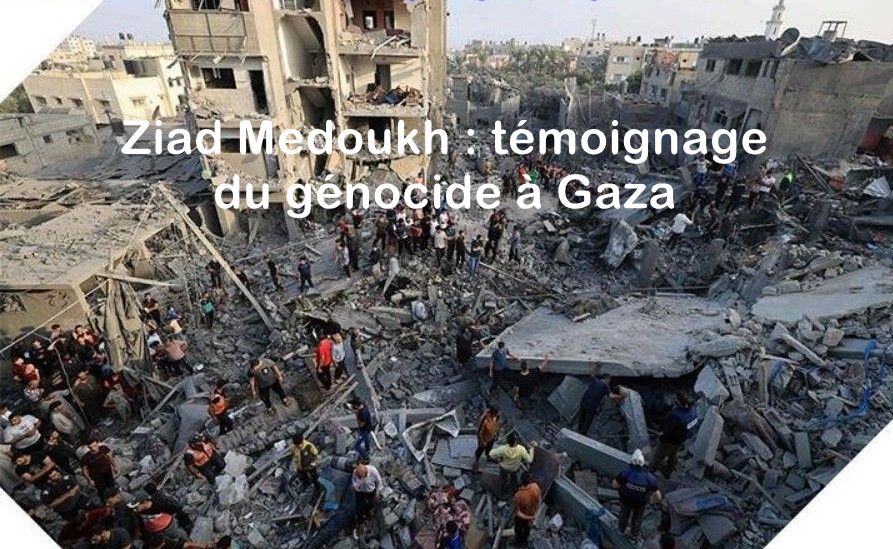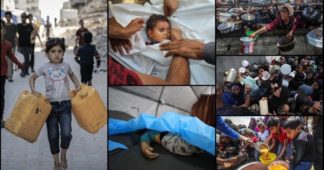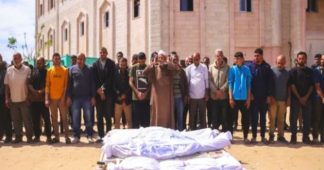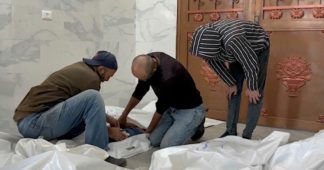Ziad Medoukh*
Jul 27, 2025
The Palestinian poet, winner of three international prizes for his poetry, a distinguished academic, head of the Department of French Studies at Al Aqsa University in Gaza and author of several books, explained to me why he chose to remain, “freely besieged” in Gaza, in an interview I conducted with him last May https://www.defenddemocracy.press/medoukh/
Yesterday I received the following message from Ziad, which I quote in full.
D.K. After 22 months of this horrific aggression, the situation in the Gaza Strip is going from bad to worse.
After 22 months of this horrific aggression, the situation in the Gaza Strip is going from bad to worse.
In addition to the intense and relentless bombings, insecurity, feelings of anguish, fear, worry, and anticipation—especially in the northern Gaza Strip—a real famine has set in.
And me, personally, I am living… I am experiencing total distress.
It’s hard to describe, to put into words just how horrible the situation is. For almost two weeks now, there has been almost nothing in the markets. Products are impossible to find, and the little that is available—some pasta, a few cans of lentils, white beans, or peas—costs an unthinkable amount of money.
I go to the market every day and come back with nothing. It breaks my heart for the children, for the people living with me. Everyone is suffering.
The slogan “No one dies of hunger in Gaza” has been replaced by “Everyone is starving to death in Gaza.”
The family and social solidarity that was always a strength in the besieged Palestinian enclave has now become minimal.
As for me, I sometimes go two or three days without eating anything. I prefer to give a piece of bread to my children rather than eat it myself. We have reached a catastrophic situation.
Only two or three aid trucks pass through each day, intended for international organizations—organizations that store their contents in warehouses under the pretext that there isn’t enough to distribute to everyone. These warehouses are regularly attacked by armed groups or starving people.
At night, armed groups or starving individuals steal these food supplies, and the international organizations say they can do nothing. I don’t know—do they have their own clientele, or are they complicit in this death trap, this famine being used as a weapon of war by the occupation?
In reality, the occupation has set up two free distribution centers since May 27, but only in the south and center of the Gaza Strip. These centers are managed by an American company, American mercenaries complicit with the occupation.
The boxes containing bags of flour and food are thrown off the trucks, and when the starving population approaches to grab a few bags or cans, the occupation opens fire on them.
From May 27 to the end of July 2025, there have been nearly 1,130 Palestinian deaths and 6,900 wounded. This shows that the plan to create these free distribution centers is a death trap for the Palestinians of Gaza.
Moreover, there are dishonest merchants who take the aid and resell it at exorbitant prices in Gaza City. For example: If a 25 kg bag of flour costs €250 (€10 per kg), it will be resold for €50 to €60 per kg in Gaza City. For 1 kg of sugar, you have to pay €130. 1 kg of rice, €80! Unthinkable!
The problem is that there are no longer any authorities, no government, no civil society to manage the situation, organize the market, or control prices. Without considering the enormous needs of the entire civilian population, merchants set their own prices to maximize profit, raising them even if the products were stolen, obtained for free, or bought at very low prices by people who took great risks to get them.
How does the population survive in such extreme conditions? Personally, I am suffering, and yet I belong to the middle class.
Along with other residents, we have decided to boycott profiteering merchants—but for how long?
I have to feed my children, but it’s too expensive.
At night, when everyone is asleep, I cry to hide my helplessness. It’s total suffering.
I keep asking myself: Am I stubborn? Because I refused to leave Gaza, am I now paying the price? I don’t know. But it’s hard to describe my total distress, my inability to act in this hell, because it’s complete powerlessness.
And yet, I am privileged because I have friends, I have networks. I speak with about ten people a day online. We talk, they comfort me, send me photos and videos of solidarity efforts.
I am active in civil society, trying to ease the pain of children, their suffering from being deprived of everything, by organizing activities and distributing toys. But inside, it’s too much. I suffer daily.
I am sick, and I can’t get treatment. There are no hospitals, no medicine, no labs—the situation is terrible.
I don’t know what to do. The feeling of helplessness is horrible. And yet, as I said, I have a network, I talk to people… I try to spend time writing, bearing witness, exchanging with friends and supporters—but it’s too much.
Nevertheless, for once, I decided to let go of my pride and asked for help through a few French, Swiss, and Belgian friends connected to organizations funding associations in Gaza. These associations claim to distribute food to hundreds of families in Gaza City and post photos and videos of their actions daily on social media. I asked for a little food for my family and me, as well as for the displaced people in my building.
The associations’ response was that they couldn’t provide anything because everything is expensive. But then how do they feed hundreds of families as they claim, with photos and videos as proof? Why can’t they send me a few food items or hot meals?
It feels like everyone is complicit in breaking the will of an already exhausted and horrified civilian population.
Imagine—people are collapsing in the streets. Often, when I go out in the morning to look for drinking water, wood, or food, I see young people—not children or the elderly, but young men aged 20 to 25—collapsing because they haven’t eaten in days.
As of Thursday, July 24, 2025, 115 Palestinians, including 85 children, have died from malnutrition.
There is nothing, nothing in the north, nothing in Gaza City—everything is extremely expensive. How much longer can we endure the unbearable? We’re still here, trying to hold on, trying to show we’re strong—but it’s too much.
No matter what testimony is given, the reality is harsher than the photos and videos shared on social media.
It’s not just famine making life unbearable in Gaza. The relentless bombings are crushing the morale of residents who no longer know where to find hope.
This is what I wanted to share with friends. Maybe it will relieve me a little…
*Ziad Medoukh, member of Bandung+70 Scientific Board, professor at Al-Aqsa University, Gaza, Palestine
Translated from French by Christian Haccuria











